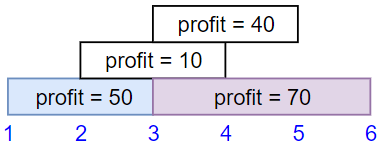ProblemPermalink
Problem ID: 1352
Title: Maximum Profit in Job Scheduling
Difficulty: Hard
Description:
We have n jobs, where every job is scheduled to be done from startTime[i] to endTime[i], obtaining a profit of profit[i].
You're given the startTime, endTime and profit arrays, return the maximum profit you can take such that there are no two jobs in the subset with overlapping time range.
If you choose a job that ends at time X you will be able to start another job that starts at time X.
Example 1:

Input: startTime = [1,2,3,3], endTime = [3,4,5,6], profit = [50,10,40,70] Output: 120 Explanation: The subset chosen is the first and fourth job. Time range [1-3]+[3-6] , we get profit of 120 = 50 + 70.
Example 2:

Input: startTime = [1,2,3,4,6], endTime = [3,5,10,6,9], profit = [20,20,100,70,60] Output: 150 Explanation: The subset chosen is the first, fourth and fifth job. Profit obtained 150 = 20 + 70 + 60.
Example 3:

Input: startTime = [1,1,1], endTime = [2,3,4], profit = [5,6,4] Output: 6
Constraints:
1 <= startTime.length == endTime.length == profit.length <= 5 * 1041 <= startTime[i] < endTime[i] <= 1091 <= profit[i] <= 104
ThoughtsPermalink
This question is similar to 1851 where you need to use DP to optimise for both value and end time. Tried to use size_t for all indexes but it leads to integer underflow and had to add an underflow check before -1. Not sure what is the cleaner way to do binary search with size_t.
SolutionPermalink
General Idea
We treat all endTimes as the only possible times in the problem. When deciding on whether or not to choose a job, we can either choose it with the best possible combinations of jobs with endTime < starTime or not choose it and have the profit set to the previously calculated best combinations of jobs.
DP State: dp[i] - represents the best profit as of jobs[i].endTime
DP transitions: We can either
- Drop the current job:
dp[i] = dp[i-1] - Choose the current job:
dp[i] = dp[k] + jobs[i].profitwherekis the largest index such thatjobs[k].endTime <= jobs[i].startTime
ImplementationPermalink
struct Job {
int start;
int end;
int profit;
};
class Solution {
public:
int jobScheduling(vector<int>& startTime, vector<int>& endTime, vector<int>& profit) {
auto n = startTime.size();
vector<Job> jobs(n);
for (size_t i = 0; i < n; i++) {
jobs[i] = {startTime[i], endTime[i], profit[i]};
}
sort(jobs.begin(), jobs.end(), [](const auto& a, const auto& b) { return a.end < b.end; });
vector<int> dp(n, 0);
for (auto i = 0; i < n; i++) {
int prev_profit = i > 0 ? dp[i-1] : 0;
const auto [start, end, profit] = jobs[i];
size_t l = 0;
size_t r = n-1;
while (l < r) {
size_t m = (l+r + 1)/2;
if (jobs[m].end <= start) {
l = m;
} else {
r = m;
if (r != 0) r--;
}
}
int curr_profit = profit;
if (jobs[l].end <= jobs[i].start) curr_profit += dp[l];
dp[i] = max(curr_profit, prev_profit);
}
return dp[n-1];
}
};